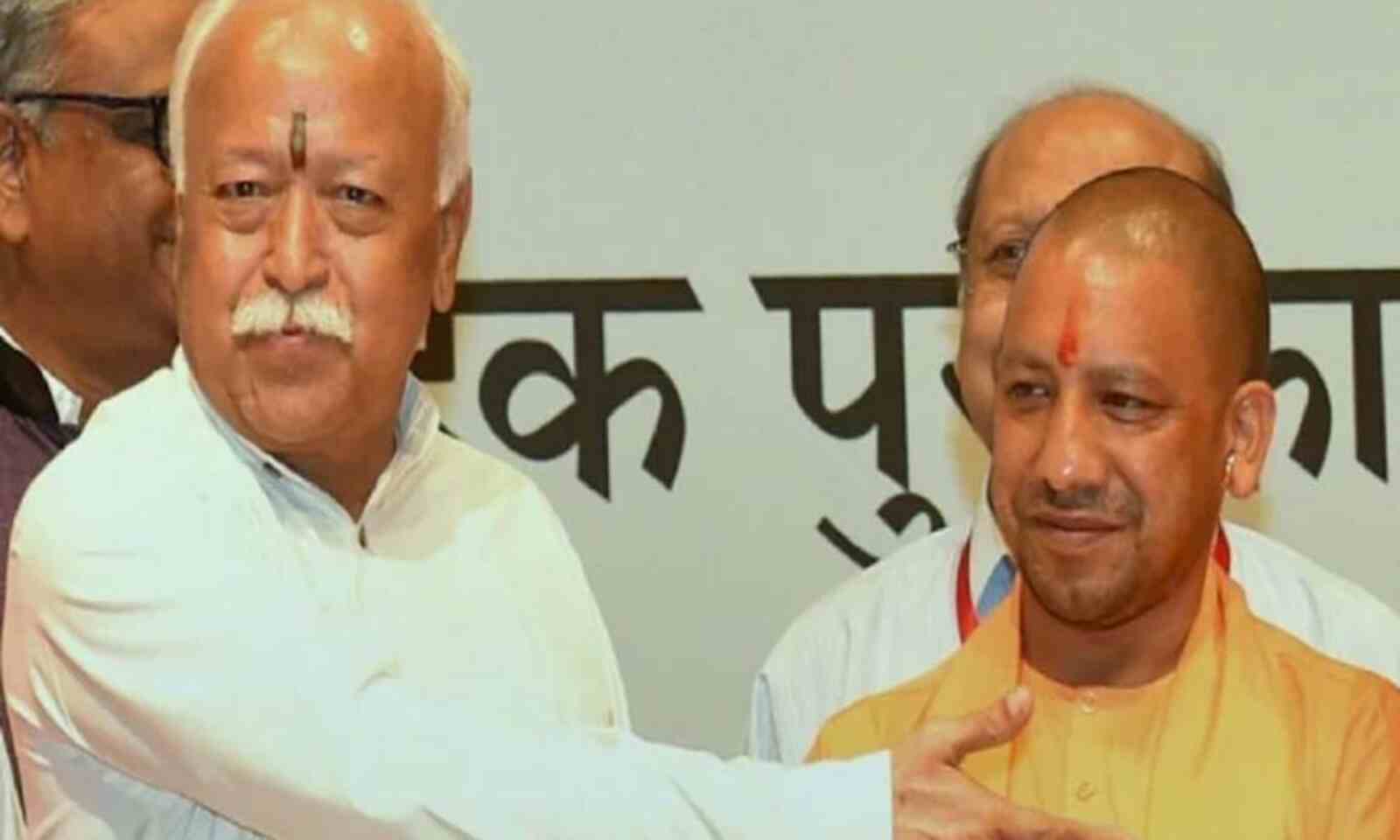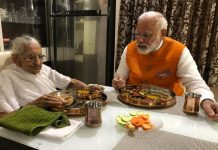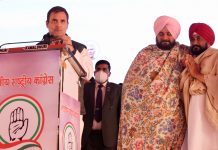
RSS chief Mohan Bhagwat has reiterated his concern over the population imbalance issue at the four-day long meet of the RSS arm at Prayagraj. However, the data shows that fears of Muslims overtaking the Hindu population are far-fetched. A report by Mudit Mathur
Amplifying the pitch of his Vijayadashmi rally message in Uttar Pradesh during its four-day long RSS Akhil Bharatiya Karyakari Mandal (ABKM) meeting at Prayagraj, the Rashtriya Swayamsevak Sangh (RSS) chief Dr Mohan Bhagwat, said, “Population imbalance leads to changes in geographical boundaries. Population control and religion-based population balance is an important subject that can no longer be ignored. So, a holistic population policy should be introduced which should be equally applicable to all.”
The UP chief minister Yogi Adityanath also joined Bhagwat at lunch in the meeting to share his concern. However, the move was also aimed at accelerating the poll promise of BJP to introduce a Uniform Civil Code – but it is easier said than done, in view of a pluralistic society governed by diverse personal laws guaranteed as fundamental rights under the Constitution of India.
Equally interesting is the stand of the Law Ministry before the Supreme Court on a series of Public Interest litigations (PIL) seeking directions for the enactment of the Uniform Civil Code (UCC) in the country. The counter affidavit of the union government was loud and clear that the court cannot direct Parliament to frame or enact any law. The Law Ministry sought dismissal of all such PILs even filed by some of its popular party leaders toeing party lines–Ashwini Kumar Upadhyay, Shazia Ilmi and others. The PIL filed by advocate Ashwini Upadhyay sought uniformity in the personal laws regulating marriage, divorce, maintenance and alimony.
The law Ministry mentioned in its reply, “This is a matter of policy for the elected representatives of the people to decide and no direction in this regard can be issued by the court. It is for the legislature to enact or not to enact a piece of legislation.” It added that the Article 44 of the Constitution is a directive principle requiring the state to endeavour to secure UCC for all the citizens, and the purpose behind Article 44 is to strengthen the object of “secular democratic republic” as enshrined in the Preamble of the Constitution.
The union government argued that the provision is provided to effect integration of India by bringing communities on the common platform on matters which are at present governed by diverse personal laws. Therefore, against the backdrop of the sensitivity of the subject matter, in-depth study of provisions of various personal laws governing different communities is required, the affidavit added.
It further stated that the matter was under in-depth examination of 21st Law Commission but its term completed in August 2018 and thereafter the government is waiting for a report of 22nd Law Commission on the subject. The government would examine the recommendations once it receives its report and hold consultations with various stakeholders.
Shazia Ilmi, a prominent Muslim face of BJP, on September 30,2022, moved the Supreme Court seeking direction to the Centre to formulate a standardised uniform common code (UCC) for grant of alimony and maintenance to obviate hindrances caused by diverse set of personal laws prescribed by different religions.
A bench of Justices Sanjiv Khanna and J K Maheshwari tagged her petition with a pending plea seeking a “gender and religion-neutral” mechanism for grant of maintenance and alimony to all citizens in keeping with the spirit of the Constitution and international conventions. Ilmi said in her petition since there are many sets of personal laws (both codified and uncodified) in Hindu, Muslim, Christian and Parsi communities, the grounds for maintenance also vary.
The Uttar Pradesh State Law Commission had last year submitted to Chief Minister Yogi Adityanath a draft population control bill and made a slew of recommendations, including additional incentives to public servants for adopting the one-child norm and banning those who violate the two-child policy from contesting local bodies polls. The recommendations were made in the 19th report on Population Control, Stabilisation and Welfare. The report along with the draft of Uttar Pradesh Population Control, Stabilisation and Welfare Bill, 2021 was handed over to the CM. But no further action was initiated yet.
The ramifications of such a law could lead to further complications as coercive population control measures would encourage sex-selection and unsafe abortion given the collective desire for a male child. Women will seek abortions as an alternative, jeopardising their health and increasing illegal practises.
Uttarakhand Chief Minister Pushkar Singh Dhami had urged all states to enact a Uniform Civil Code like Uttarakhand is going to do. Addressing an event in Udham Singh Nagar district, Dhami said that a committee has been constituted under the chairmanship of retired justice Ranjan Prakash Desai to implement a Uniform Civil Code in Uttarakhand, after interacting with all stakeholders and the public. He said a Uniform Civil Code would be implemented in the state soon.
Minister for Social Welfare of Karnataka, Kota Shrinivas Poojari was quoted as saying that the controversial Uniform Civil Code will be implemented in the country one day. “The BJP is committed to bring in the Uniform Civil Code and it is going to implement it. It was the BJP, which had terminated Article 370 in Jammu and Kashmir,” he said.
In Bihar, the Janata Dal United chief minister Nitish Kumar resisted the BJP move to bring Uniform Civil Code. JD(U) Minister Ashok Choudhary explained, “Our leader Nitish Kumar has always maintained that there should be peace, mutual-respect, and harmony in the society. We have been successful in ensuring that. So there seems to be no need why we should have a uniform civil code here.”
The All India Muslim Personal Law Board (AIMPLB) said in a resolution passed in its 27th public session that the Uniform Civil Code (UCC) is neither suitable nor useful for a vast multi-religious country like India. It further said that the UCC was negating the fundamental right to practice religion as enshrined in the Constitution. “India is a multi-faith country, and every citizen is guaranteed to practice and profess his faith and religious beliefs, and to act on and preach the same. Any attempt in this direction is discordant with the fundamental rights enshrined in our Constitution,” the resolution added.
It is worth mentioning that the Supreme Court of India has in large number of cases rejected attempts to seek issue of writs praying for the introduction of Uniform Civil Code or declaring certain enactments relating to family law alleged to be discriminatory as unconstitutional. Some petitions before it came to declare Muslim Personal Law which allows polygamy as void as offending Articles 14 and 15 of the Constitution. Other petitions raised issues such as Muslim Personal Law enables a Muslim male to give a unilateral Talaq to his wife without her consent and without resorting to judicial process of courts to be violative of Articles 13,14 and 15 of the Constitution of India. The apex court stayed away from such cases saying these involve policy matters.
All India Majlis-e-Ittehadul Muslimeen (AIMIM) chief and MP Asaduddin Owaisi denied RSS chief Bhagwat’s assertions on population control and said the Muslim population is declining. “The population of Muslims is not increasing, instead it is declining. The gap between children is also increasing among Muslims. Who is using condoms the most? We are,” Owaisi remarked recently at a gathering of Jalsa Rahmatullilaalameen in Nampally. Quoting National Family Health Survey-5, he said the total fertility rate (TFR) of Muslims has seen the highest drop.
In such a backdrop, the RSS chief’s address to its core cadre about population imbalance resulting in demographic changes appears to be a new ploy of diverting people’s attention from the utter failure of the BJP government on the economic front. Earlier Bhagwat outreach to Muslim intellectuals in a Delhi Mosque was weighed as a fallout of Congress leader Rahul Gandhi’s Bharat-Jodo Yatra, which is drawing huge crowds, and dismantling false propaganda about his being a dim witted “Pappu”.
The Covid-19 pandemic was not only confined to India but it hit hard globally. America suffered the worst in terms of Covid deaths but was able to restore and revive its economy. The American dollar is strengthening and Indian Rupee is declining sharply amid acute shortage of foreign reserves, growing NPA of Banks due to loan defaults and ever rising repayment bills of international debts. The Indian government did not give any cash bailout package to farm or MSME sectors that caused huge unemployment and imminent danger of economic recession.
Realising the tough times of the corona global pandemic, even the then US President Donald Trump announced a $19 billion bailout package for farmers who were hurt financially by the coronavirus crisis. The aid plan included $16 billion in direct payments to farmers to boost their incomes, along with $3 billion in government purchases of meat, dairy products, and other foods. Most of the other countries have followed suit. But in India, farmers have battled to have an identical bailout economic package released for them to tide over the difficult period, but Prime Minister Narendra Modi has not obliged them.
Narendra Modi returned to power in May 2019. During his Independence Day speech that year, the prime minister raised concerns over India’s “population explosion,” underlining the need for greater discussion and awareness on the issue. Since Independence, the two-child policy has been tabled in Parliament more than 35 times. However, it has failed to become a law in view of constitutional provisions and international treaties. Amid ongoing explosive debate over the issue, the Union Minister of State for Health, Bharati Pravin Pawar, had stated before Rajya Sabha, “The Centre is not contemplating any legislative measures to control India’s population.”
The share of Hindus in the total population came down marginally from 80.5 per cent in 2001 to 79.8 per cent in 2011—a decline of 0.7 per cent. While the share of the Muslim population, which in 2001 was 13.4 per cent, went up marginally in 2011 to 14.2 per cent, a 0.8 per cent increase.
In terms of absolute numbers, Population Foundation of India (PFI) figures reveal that the Hindu population increased by 139 million during 2001-11, while the Muslim population increased by 34 million. A far cry from the vision of Muslim demographic domination being propagated to mobilise Hindus. Overall, while the fears of Muslims overtaking the Hindu population are far-fetched, in some states there needs to be greater awareness created to ensure a uniform decline in population growth.













